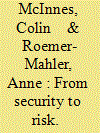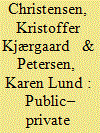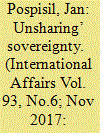|
|
|
Sort Order |
|
|
|
Items / Page
|
|
|
|
|
|
|
| Srl | Item |
| 1 |
ID:
157969


|
|
|
|
|
| Summary/Abstract |
This article examines the rise of maritime security in concept and practice. We argue that developments in the maritime arena have flown beneath the radar of much mainstream international relations and security studies scholarship, and that a new agenda for maritime security studies is required. In this article we outline the contours of such an agenda, with the intention of providing orientation and direction for future research. Our discussion is structured into three main sections, each of which outlines a core dimension of the maritime security problem space. We begin with a discussion of the issues and themes that comprise the maritime security agenda, including how it has been theorized in security studies to date. Our argument is that the marine environment needs to be understood as part of an interlinked security complex, which also incorporates strong connections between land and sea. Second, we examine the ways in which maritime security actors have responded to these challenges in practice, focusing on issues of maritime domain awareness, coordination of action, and operations in the field. Third, we turn to the mechanisms through which the new maritime security agenda is being disseminated to local actors through a process of devolved security governance. We focus particularly on efforts to distribute knowledge and skills to local actors through capacity building and security sector reform. In the conclusion, we outline the future challenges for maritime security studies that follow from these observations.
|
|
|
|
|
|
|
|
|
|
|
|
|
|
|
|
| 2 |
ID:
157974


|
|
|
|
|
| Summary/Abstract |
This article explores the role big data plays in the national security decision-making process. The global surveillance disclosures initiated by former NSA contractor Edward Snowden have increased public and academic discussions about big data and national security. Yet, efforts to summarize and import insights from the vast and interdisciplinary literature on data analytics have remained rare in the field of security studies. To fill this gap, we explain the core characteristics of big data, provide an overview of the techniques and methods of data analytics, and explore how big data can support the core national security process of intelligence. Big data is not only defined by the volume of data but also by their velocity, variety and issues of veracity. Scientists have developed a number of techniques to extract information from big data and support national security practices. We find that data analytics tools contribute to and influence all the core intelligence functions in the contemporary US national security apparatus. However, these tools cannot replace the central role of humans and their ability to contextualize security threats. The fundamental value of big data lies in humans' ability to understand its power and mitigate its limits.
|
|
|
|
|
|
|
|
|
|
|
|
|
|
|
|
| 3 |
ID:
157973


|
|
|
|
|
| Summary/Abstract |
The much hyped rise of the BRICS (Brazil, Russia, India, China and South Africa) has lately been met with equally fervent declarations of their demise. Amid slowing growth in many of these countries, the prevailing view now appears to be that the rise of the BRICS was little more than an illusion. In this article, however, I contest this assessment by arguing that the emerging powers were never solely, nor most importantly, merely an economic phenomenon. Instead, I show that emerging powers—specifically Brazil, India and China—have become an important political force in the global trading system and have had a profound and lasting impact on the World Trade Organization (WTO). Contrary to the widespread assumption that these countries are too diverse to ally, I argue that the emerging powers displayed a remarkable degree of unity and cooperation, working in close concert to successfully challenge the dominance of the US and other established powers. As evidenced by the collapse of the Doha Round, the collective rise of Brazil, India and China substantially disrupted the functioning of one of the core institutions of the liberal economic order created under US hegemony.
|
|
|
|
|
|
|
|
|
|
|
|
|
|
|
|
| 4 |
ID:
157971


|
|
|
|
|
| Summary/Abstract |
Forced male circumcision has not yet been recognized as a specific gendered human rights abuse in international humanitarian law. This article takes the first step towards assessing these acts by considering them in the context of post-election violence in Kenya in 2007. This case allows for the exploration of how forced male circumcision was used in a context of political violence and militia-led—and often state-sanctioned—terror. The article thus considers multiple legal issues and concerns that arise from this sort of violence in different contexts. I situate the case within a larger framework of conventional understandings on gender and violence as a means to question them and render them problematic. Specifically, I argue that understanding sexual violence as exclusively targeting women prevents appropriate prosecution of forced male circumcisions in Kenya and of sexual violence against men more generally. Sexual violence against men involves forms of emasculation in which perpetrators seek to feminize their victims by rendering them weak, violated and passive, in contradistinction to stereotypical masculine ideals. If one's relationship to femininity is a crucial issue in sexual violence, whether the victims are men or women, then being able to properly account for cases like Kenya, in both a political and a legal sense, is crucial to legal accountability for sexual violence more broadly.
|
|
|
|
|
|
|
|
|
|
|
|
|
|
|
|
| 5 |
ID:
157970


|
|
|
|
|
| Summary/Abstract |
The rise of health issues such as HIV, pandemic influenza and Ebola on international agendas has led to the framing of threats to health as security issues. This has created an uneasy relationship between politics and health, by moving national interests into an area traditionally dominated by scientific rationalities and a predisposition towards cosmopolitan norms. Framing global health threats as risks, however, appears to be less politically charged and divisive, combining an aura of scientific objectivity with a moral call to action. In this article we argue that, despite its technical use in public health, in the policy discourse on global health the risk frame is not immune to values and interests but inherently political. It privileges a specific approach to global health policy which focuses on potential future catastrophes rather than presently existing health problems, emphasizes technological solutions rather than addressing the socio-economic determinants of health, while there is no single risk frame, but rather multiple risk frames existing simultaneously, as seen during the 2014–15 west African Ebola outbreak. However, framing health in terms of risk is useful in understanding how health issues reflect and contribute to the wider Zeitgeist concerning societal vulnerability: that dangers exist which are uncontrollable and are the product of technical progress. The risk frame allows us to place health issues into this wider context, where disease is just one of a number of concurrent dangers, rather than a separately identifiable hazard.
|
|
|
|
|
|
|
|
|
|
|
|
|
|
|
|
| 6 |
ID:
157972


|
|
|
|
|
| Summary/Abstract |
The weakening of the West's global domination and the growing unwillingness on part of the US to defend the liberal order have increased the importance of regional-level international politics. For the past decade, China and Russia have stood out among rising powers attempting to rearrange their neighbourhoods. A significant part of International Relations scholarship regards this drive for regional predominance as a natural and unavoidable consequence of rising material power. Analysing China's and Russia's flagship regional initiatives, the New Silk Road and the Eurasian Economic Union, this article offers a more nuanced explanation of rising powers and their role in contemporary international order. The article argues that China and Russia have different visions of regionalism and distinct views on how a regional order should be arranged. China defines regionalism in functional rather than territorial terms and sees its project as inclusive. The Chinese ruling elite regards the New Silk Road as a way of reinforcing China's links with the outside world and as furthering the benefits it harvests from globalization. Russia, in turn, interprets regionalism in spatial and historical terms, seeing it primarily as a way to reorganize the post-Soviet space. The Russian elite considers the Eurasian Economic Union to be a protectionist measure against globalization and a barrier against the influence of other actors. China defines principles on which cooperation is based in vague terms and emphasizes the flexibility and openness of its project. Russia opts for universal and legally binding norms, which reinforces the defensive nature of its regional project.
|
|
|
|
|
|
|
|
|
|
|
|
|
|
|
|
| 7 |
ID:
157976


|
|
|
|
|
| Summary/Abstract |
The governance of cyber-security risks is seen as increasingly important to the security of the nation. However, cyber-security risks are characterized by a fundamental uncertainty, which poses a great challenge to their governance and calls for new modes of organizing security politics. Public–private partnerships (PPPs) are often seen as the answer to this challenge by enhancing flexibility and robustness through knowledge-sharing. Engaging with the literature on PPPs and the Danish practice on cyber security, we show how PPPs involve controversies over different threat realities of cyber security. This plays out as controversies over what is considered threatened, the scope of the issue and the kind of expertise to be mobilized. Arguing that PPPs on security are not defined narrowly by short-sighted strategic self-interest but also loyalty and commitment, we suggest that the innovative potential of such PPPs lie not in a possible consensus on a common purpose and threat reality, but in the ability to embrace divergent definitions and approaches to cyber security. Acknowledging the corporate interests and loyalty, we suggest a move towards the notion of partnering through dissent.
|
|
|
|
|
|
|
|
|
|
|
|
|
|
|
|
| 8 |
ID:
157975


|
|
|
|
|
| Summary/Abstract |
In order to work, international peace- and statebuilding has had to reshape the traditional notion of state sovereignty and legitimize increasingly interventionist endeavours in terms of an attenuated ‘shared’ sovereignty. Over the last decade, however, governments in recipient states have pushed back, demanding a more active role in negotiating with their OECD counterparts. The g7+ group, an international organization of now 20 self-proclaimed fragile states, has evolved as a key actor from the global South dealing with international peace- and statebuilding. The group's approach to multilateral negotiations on development goals, and its creative use of donor concepts and approaches such as resilience, ownerships and measuring development progress, challenge the customary peace- and statebuilding practices. This challenge demonstrates that political elites in fragile states have started to self-confidentially occupy the arenas of statebuilding and development. This article argues that in so-doing the g7+ group establishes a post-liberal sovereignty claim that is based on two pillars: resilient nationhood, and selectivity in the application of global liberal principles. Since it relies on the development policy principle of national ownership, such post-liberal sovereignty is difficult to counter for actors subscribed to liberal norms. Effectively, sovereignty is ‘unshared’ again.
|
|
|
|
|
|
|
|
|
|
|
|
|
|
|
|
|
|
|
|
|